Key takeaways:
- Aquatic workshops connect participants with marine life, fostering curiosity and empathy towards conservation efforts.
- Animal protection is vital for biodiversity; understanding the emotional intelligence of animals promotes responsible stewardship of the environment.
- Leading workshops enhances personal growth, communication, and organizational skills, while building a supportive community of advocates.
- Future initiatives should leverage technology and community involvement, coupled with educational programs that empower individuals to take actionable steps in conservation.
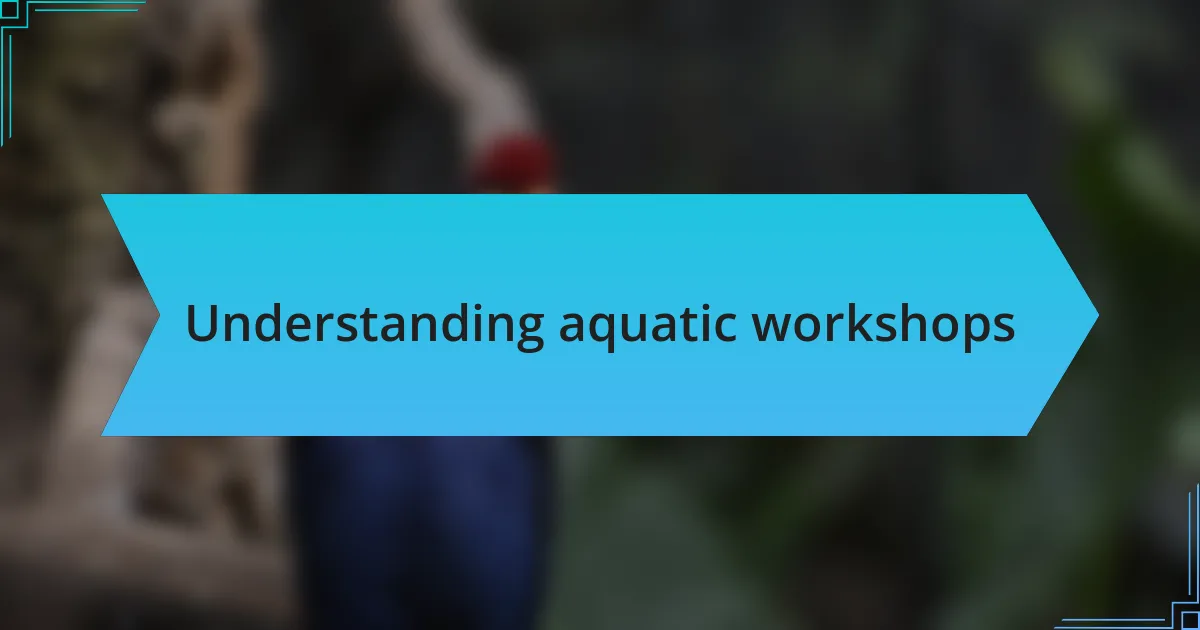
Understanding aquatic workshops
Aquatic workshops serve as a unique platform for connecting participants with marine life while fostering a passion for conservation. I remember the excitement I felt watching first-time attendees’ eyes light up as they interacted with various aquatic species, sparking a sense of curiosity that many hadn’t experienced before. It made me ponder—how often do we get a chance to learn about ecosystems firsthand?
These workshops are more than just educational; they are transformative experiences. I recall one participant, initially hesitant about the water, gradually finding confidence as they explored the natural habitat. Witnessing this personal growth reinforced my belief that these interactions create lasting connections between individuals and the environment. Isn’t it astonishing how a little exposure can nurture empathy toward the oceans?
Moreover, aquatic workshops emphasize teamwork and collaborative learning, which I found incredibly valuable. During one session, we formed small groups to tackle challenges related to sustainability. The camaraderie that developed through shared goals not only enriched the experience but also fostered a community committed to marine advocacy. Could there be a better way to inspire collective action for a cause we all care about?
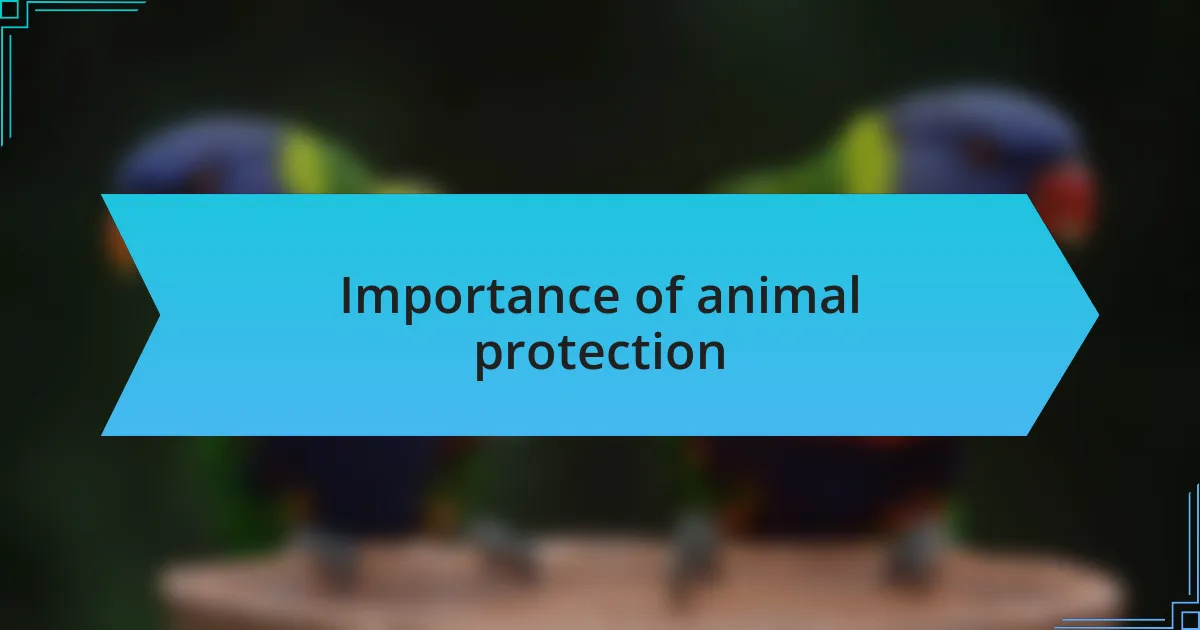
Importance of animal protection
Protecting animals is crucial for maintaining biodiversity and ecological balance. I’ve often found myself asking, what would our world look like without certain species? Each animal plays a unique role in their ecosystem, and losing even one can have a cascading effect. I think back to a time when I learned about the impact of declining bee populations on pollination. It was a somber reminder that animal protection is about preserving the intricate web of life.
Additionally, considering the ethical dimensions of animal protection is essential. I remember a moment during my workshops when a young participant shared their newfound understanding of animal intelligence and emotions. Their realization that animals experience pain and joy just like we do stirred something deep within me. It made me wonder—how can we advocate for compassion toward creatures that share our planet? This perspective fosters empathy, which is vital in promoting responsible stewardship of the environment.
Lastly, the legal frameworks surrounding animal rights highlight the importance of collective action in protecting these beings. I often reflect on how advocacy has led to critical changes in policies that safeguard wildlife. Engaging with others in discussions about these laws not only informs but also inspires action. Isn’t it powerful to think that our voices can drive meaningful change in animal protection?
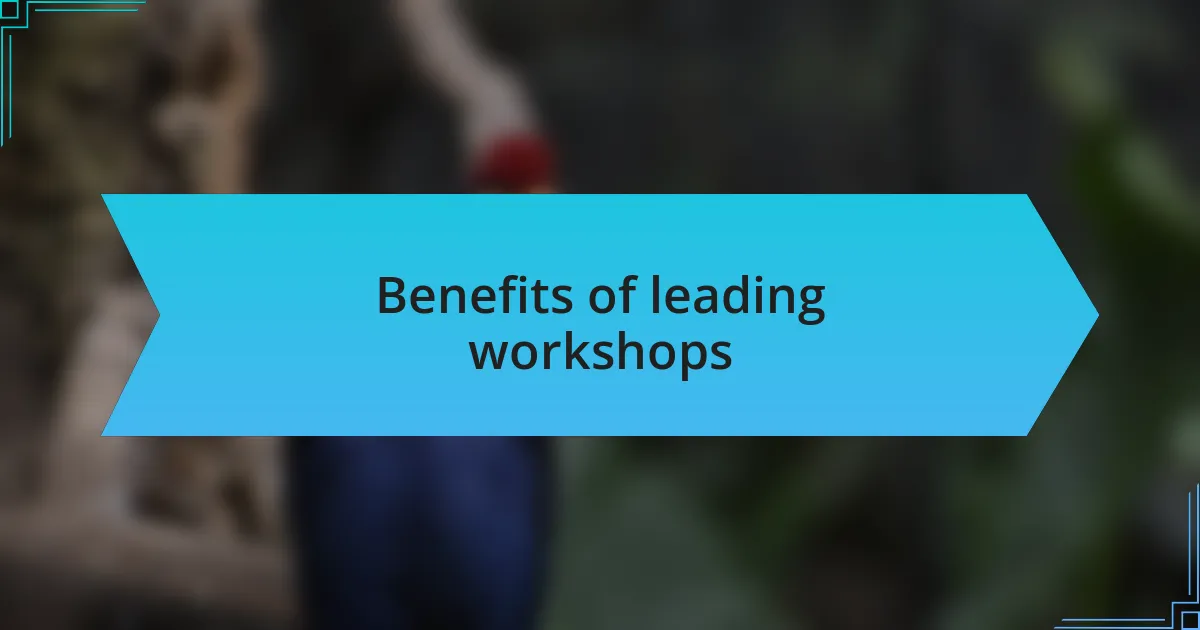
Benefits of leading workshops
Leading workshops offers a transformative experience not only for participants but also for the leader. I vividly remember the first time I stood before a group of enthusiastic attendees, armed with knowledge about aquatic ecosystems. The energy in the room was palpable, and as I shared stories about marine life, I saw their eyes light up with curiosity and understanding. That moment reinforced my belief in the power of education—it can spark awareness and motivate individuals to become advocates for animal protection.
Moreover, facilitating workshops enhances my own understanding of the material. When preparing to lead a session, I often dive deeper into research and various perspectives, which in turn enriches my knowledge. There was a particular workshop where I had to explain the importance of wetland conservation. As I navigated the complexities of the topic, I discovered insights that even surprised me. This iterative learning process is invigorating—it keeps me engaged and passionate about the subject matter.
Additionally, leading workshops fosters a sense of community among participants. I recall a particularly moving discussion among attendees who shared personal stories of animal encounters that changed their lives. It was amazing to witness these connections as people moved from being mere attendees to a supportive network of advocates. How can one not feel uplifted by such sharing? It’s moments like these that remind me of the collective effort needed to drive real change in animal welfare.
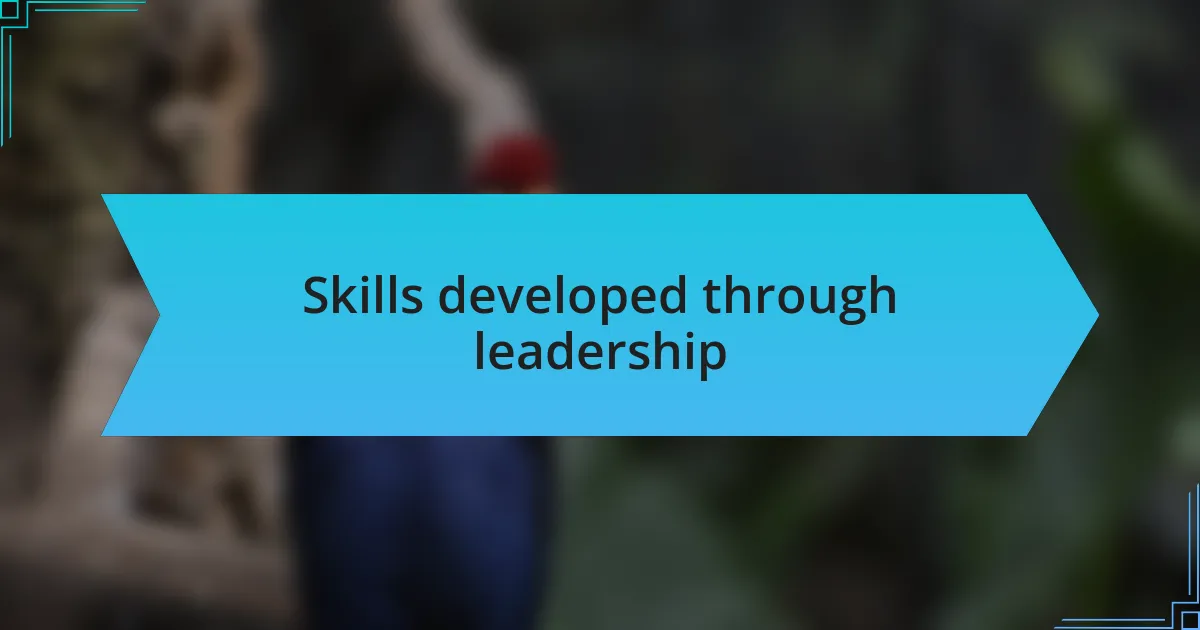
Skills developed through leadership
Leading an aquatic workshop cultivated my ability to communicate complex ideas simply and effectively. I remember one session where I had to explain the delicate balance of marine ecosystems to a diverse audience. Observing their varying degrees of familiarity with the subject made me realize the importance of adapting my message. How often do we overlook the need for clarity in communication? This experience taught me to connect with my audience while ensuring that everyone grasped the key points.
Beyond communication, leadership sharpened my organizational skills. I organized various activities, from hands-on demonstrations to small group discussions, all within a time-limited framework. One particular challenge was coordinating a beach cleanup event post-workshop. Juggling logistics, while keeping everyone motivated, forced me to improve my multitasking abilities and think on my feet. It’s incredible how leadership pushes you to adapt and grow.
Additionally, I developed empathy as I navigated different personalities and learning styles within the group. I often found myself reflecting on how to make everyone feel included and valued. In one instance, an attendee hesitated to share her thoughts, fearing judgment. Taking the time to encourage her not only boosted her confidence but also enriched our discussion. Isn’t it fascinating how leadership fosters a deeper understanding of others? This empathy has since become a crucial skill in my interactions—both in workshops and beyond.
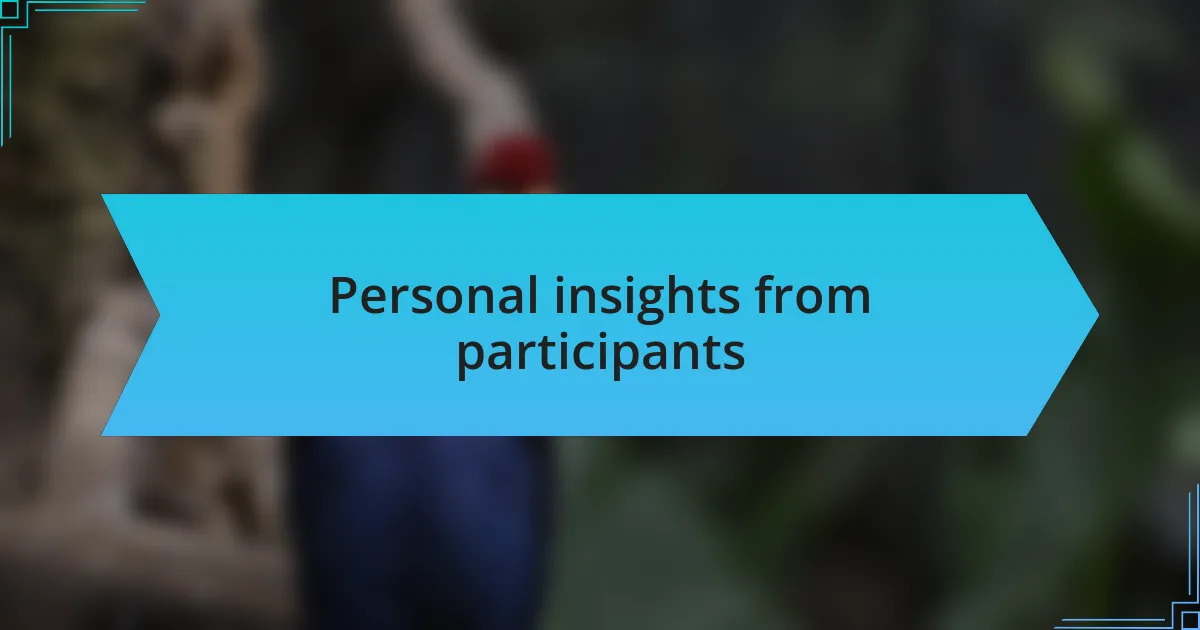
Personal insights from participants
Participants in the aquatic workshop often shared transformative moments. One individual recounted how they had come to view marine life with a newfound respect after a hands-on activity involving local species. It was enlightening to hear them express that simple experiences can shatter preconceived notions, isn’t it remarkable how direct engagement with nature can shift our perspectives?
Another participant mentioned the encouragement they felt while discussing their concerns about marine conservation. They noted that the supportive environment I aimed to create allowed them to voice their thoughts without hesitation. This affirmation highlighted for me that fostering a safe space for dialogue can have profound effects, revealing how essential it is for people to feel heard and embraced.
I also found it fascinating when numerous attendees reflected on their commitment to environmental activism after the workshop. Their desire to transform knowledge into action was palpable. One participant shared how they were inspired to initiate a local marine conservation project, sparking excitement not just for themselves but for their community. Isn’t it incredible how a single workshop can ignite a passion for change?
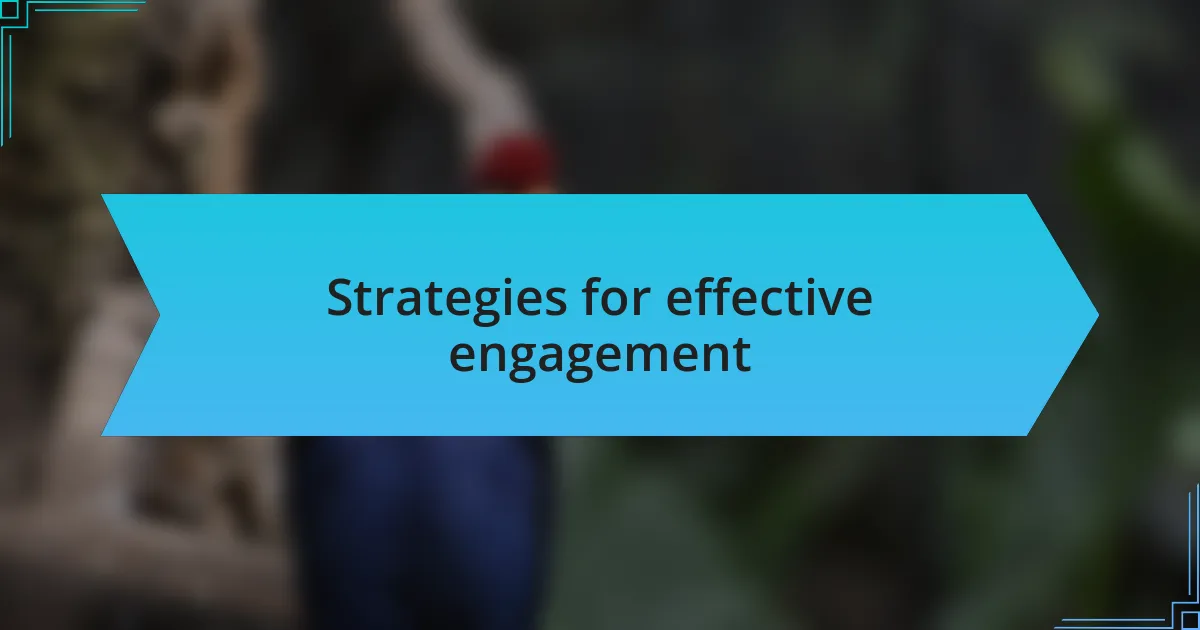
Strategies for effective engagement
Effective engagement often hinges on creating interactive experiences that resonate with participants. For instance, I discovered that incorporating games or challenges related to marine ecosystems not only keeps the energy high but also transforms learning into fun. Can you imagine how much more memorable a lesson on coral reefs becomes when participants have to simulate their growth through a teamwork challenge?
Another strategy I found valuable was using storytelling to connect emotionally with participants. Sharing a personal experience about witnessing the impacts of plastic pollution on marine life prompted attendees to reflect deeply on their own behaviors. This highlighted how powerful narratives can bridge the gap between intellect and emotion, making the call to action much stronger. Have you ever felt a twinge of guilt leading you to change your habits after hearing a touching story?
Lastly, I realized that encouraging questions and discussions throughout the workshop significantly deepened engagement. At one point, someone voiced a concern about climate change effects on breeding grounds, sparking a lively discussion. I couldn’t help but feel that this spontaneous dialogue enriched the learning experience, allowing participants to take ownership of the topic. Isn’t it amazing how simply asking questions can open doors to new insights and foster a sense of community?
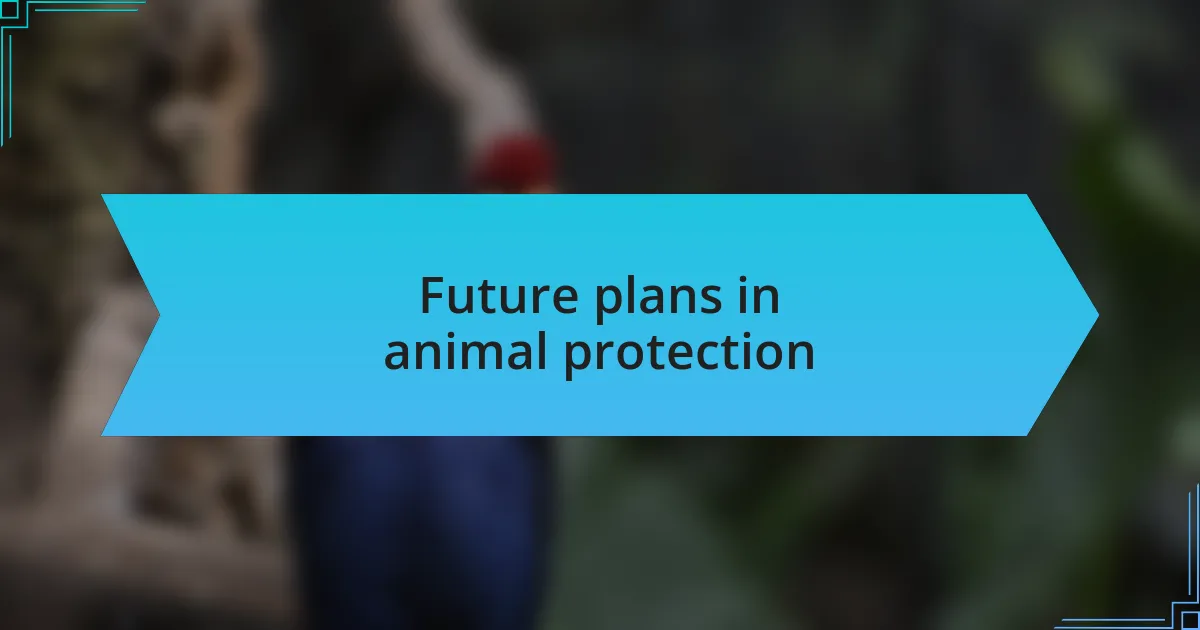
Future plans in animal protection
As I look toward the future of animal protection, one area I find particularly inspiring is the integration of technology into conservation efforts. For instance, I’ve seen how drone technology can aid in monitoring wildlife and their habitats. It made me wonder, how much more effective could our work become if we leveraged innovative tools to track animal movements and detect poaching?
Another plan I’m excited about is strengthening community involvement in conservation initiatives. During my workshop, I witnessed firsthand the passion people have when they feel connected to a cause. This connection can be a catalyst for action—what if we could encourage more communities to adopt local animal protection programs? I believe tapping into that grassroots enthusiasm can create powerful allies for wildlife.
Lastly, I envision a future where education programs include not only awareness but also actionable steps for participants. Reflecting on my past experiences, I’ve noticed how a well-informed participant feels empowered to make a difference. Could it be that providing concrete ways for individuals to contribute, like organizing local clean-ups or habitat restoration projects, could amplify our collective impact? I truly believe that equipping people with the right tools will elevate the entire movement of animal protection.